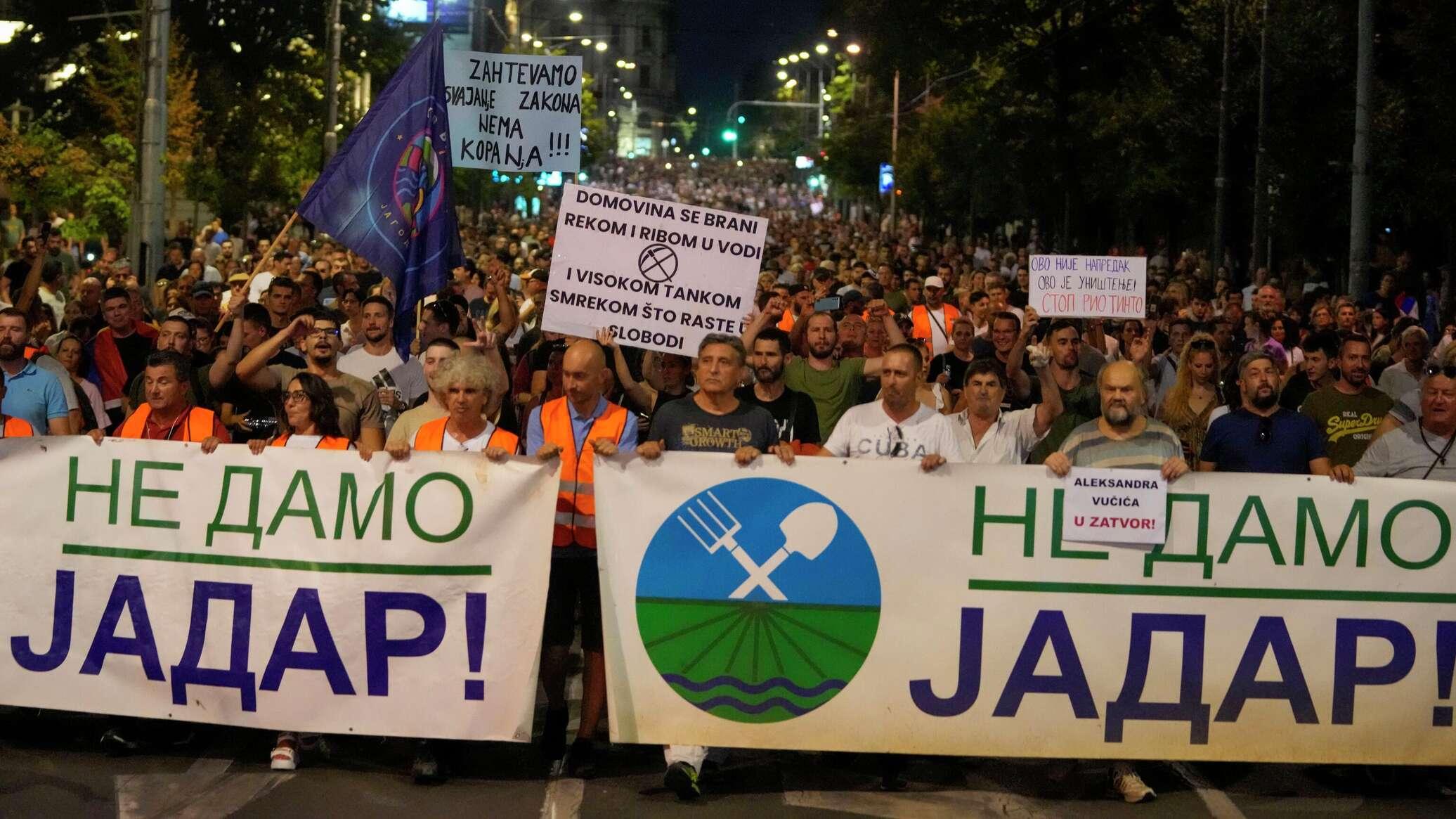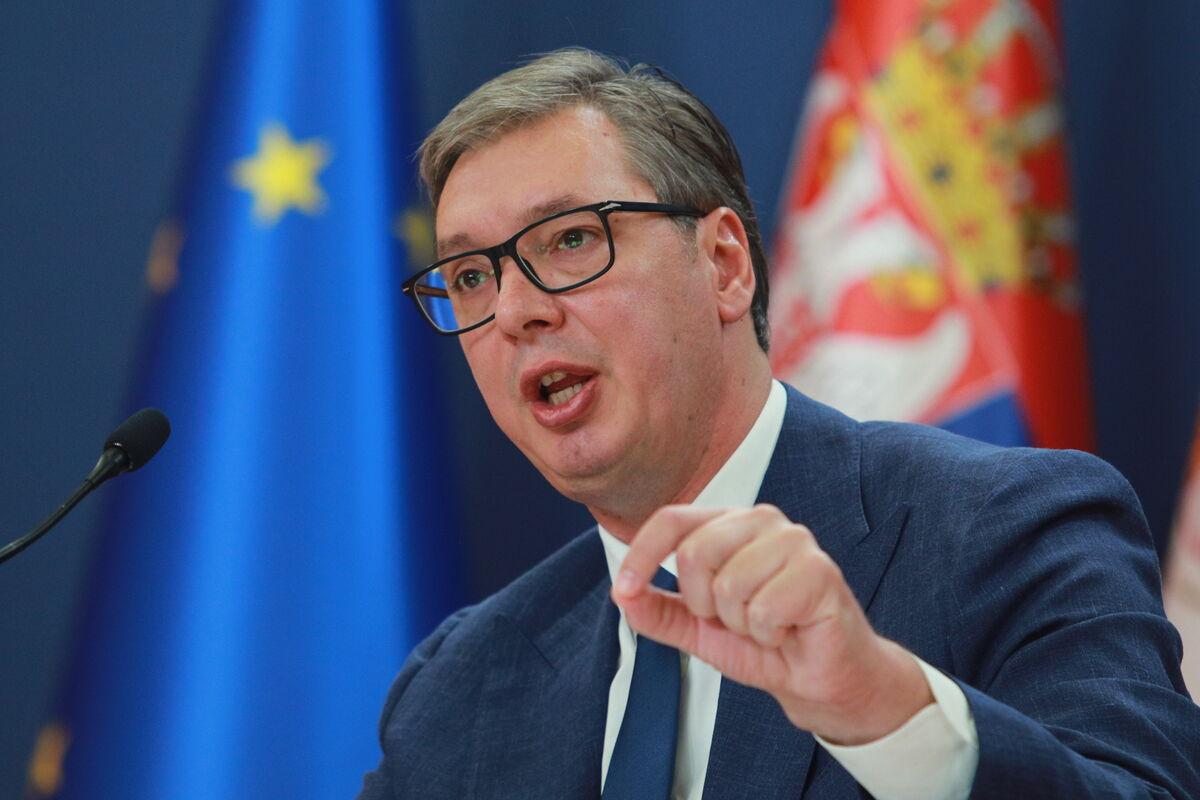Serbia’s lithium showdown: Who’s stirring the pot? Vučić's independent stance sparks EU frustration
On August 10, thousands of protesters — up to 27,000 people — took to the streets of Belgrade, rallying against plans to open a mine for the lithium-containing mineral jadarite. As the marchers passed the presidential palace, they hurled insults at President Aleksandar Vučić and unfurled a 30-meter Serbian flag while chanting, "Rio Tinto, get out of Serbia!" The protest also included blocking railway traffic, actions that Vučić condemned as "violence and terror of the minority over the majority." He supported the security forces' measured response, noting their professionalism in handling the situation without resorting to violence, as would be expected in any Western country. Vučić emphasized that the protest occurred in a democratic atmosphere, with a few persistent violators of public order being detained.
Understanding the roots of this unrest is crucial. Lithium, a rare earth metal essential for battery production, is in high demand globally. It is mined in countries like China, Argentina, Chile, and Bolivia. Serbia's lithium deposit along the Jadar River was discovered in 2005, attracting the attention of Rio Tinto, the Australian-British mining giant.
The company gradually began developing the jadarite deposits near Loznica. However, once the Serbian government approved the project, a wave of protests erupted across Serbia under the banner "Stop Rio Tinto," gaining momentum, especially in 2022. Protesters expressed frustration over the EU's pressure on Serbia to proceed with the project, pointing out that lithium deposits in Germany were not being exploited. Consequently, in the same year, Belgrade revoked the license for the $2.4 billion Jadar project.

However, some Serbian media speculated that this decision was influenced by the previous controversy surrounding the deportation of Serbian tennis star Novak Djokovic from Australia. Djokovic was set to compete in the Australian Open but was deported due to his unvaccinated status against COVID-19. Serbian publications responded with headlines like "Serbia - Australia 1:1," suggesting a tit-for-tat dynamic.
Regardless, in July of this year, Serbia's Constitutional Court overturned the government's 2022 decision, and on July 18, 2024, President Vučić revealed that Belgrade "will develop the lithium deposit with Germany and the EU, not with China," to boost "the Serbian economy and accelerate the country's integration into the EU."
He emphasized Serbia's loyalty to Europe, stating, "We are not negotiating with China because EU membership is far more important for our citizens, and our goal is to become part of the EU." When asked how Serbia could pursue EU membership while also aligning with Russia and China, Vučić responded, "I am sitting on only one chair: the Serbian chair." He also highlighted that Serbia could produce about 60,000 tonnes of lithium per year, supplying it to EU countries eager to reduce their reliance on Chinese lithium. According to Vučić, the project could enable the production of over one million electric cars.
On July 19, the European Union and the Serbian government signed an agreement on lithium supplies, which German Chancellor Olaf Scholz stated "will help Europe maintain its independence by increasing battery and electric car production." Under the agreement, Serbia will receive approximately €6 billion in EU investment, along with assistance in building a battery factory. Experts noted that lithium mining could become "Serbia's entry ticket to the European Union," as Belgrade has strategically chosen to develop Europe's largest lithium deposit in partnership with Germany and the EU, rather than with China.
In the wake of the signed agreement, some analysts speculated that certain factions within the EU might push for the deal, anticipating that it could spark a wave of anti-government protests throughout Serbia. These protests, if orchestrated effectively, could potentially undermine President Vučić, whose independent policies have irked the EU.
Indeed, the opposition began organizing demonstrations shortly after the agreement was signed. On August 9, Vučić issued a stark warning to Moscow about the planned mass protests in Serbia, allegedly orchestrated by several Western countries. He emphasized that "the fantasies of those who seek to achieve their goals through force will be shattered." In alignment with this, the Serbian newspaper Vecernje Novosti reported on plans by the pro-Western opposition to leverage the protests to seize the presidential palace and initiate a "Ukrainian scenario," employing tactics typical of colour revolutions.
Thus, as noted by several analysts, both Serbian and international, while the "lithium" agreement Vučić signed with the EU is highly advantageous for Europe, many European leaders hope that the ensuing protests will pressure the Serbian president to step down. Vučić's independent stance on various issues has been a source of frustration for them. Notably, in April of this year, Vučić confided in Azerbaijani President Ilham Aliyev during a phone conversation about the mounting pressure Serbia has been facing and sought support from the friendly Azerbaijani people.
Vučić's independent perspective on international matters was once again highlighted in his recent interview with the German newspaper Handelsblatt. When asked about Serbia being the only European country that does not support Western sanctions against Russia and whose president continues to engage with Russian officials while pursuing a free trade agreement with China, Vučić responded: "But Germany also sends members of the government to China, and Scholz meets with Xi Jinping. This is perfectly normal and reasonable. Everyone should defend their own interests, which is what we are doing."

In the context of the ongoing conflict between Russia and Ukraine, Serbian President Aleksandar Vučić emphasized that "a ceasefire must be achieved as soon as possible, regardless of the terms, and only then can we discuss territorial issues and Ukraine's potential accession to NATO or the EU." Addressing Serbia's sale of ammunition, which has reportedly ended up in the hands of the Ukrainian army (Handelsblatt reported that Belgrade sold ammunition worth about 800 million euros to Ukraine's allies early in the war, which was later delivered to Kyiv), Vučić calmly stated, "Serbia has a military industry, and we only sell ammunition, not weapons, to reliable end-users. Neither Russia nor Ukraine qualifies as such, so we do not supply anything to them. However, we are not responsible for what other countries do with our ammunition. I have no intention of discussing how we conduct our business, and I trust you understand that."
This stance highlights Vučić's independent approach to global geopolitics, even as he finds common ground with the European Union on the lithium project. It is precisely this independence that has drawn criticism from European leaders. In this context, the lithium issue could become a focal point through which external forces may attempt to destabilize Serbia by fueling protests aimed at unseating Vučić. In their view, a change in power in Belgrade could bring an end to internal unrest in Serbia.
Simultaneously, some observers speculate that the agreement between Belgrade and Brussels could create challenges for Beijing, which has invested heavily in battery and electric vehicle production plants in Hungary. If this speculation proves true, Hungary might inherit unprofitable Chinese production facilities along with significant debt, putting China's investments in Hungary at risk.
Whether Beijing will quietly observe these developments remains to be seen. The answer to that question may unfold sooner than expected.
by Teymur Atayev, exclusively for Caliber.Az
The opinions and perspectives presented by guest columnists in their articles may not align with those of the editorial board and do not necessarily represent its official stance.








